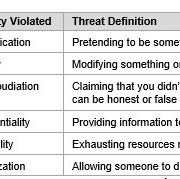Reap the full benefits of enhanced code quality, better testing practices, and early error detection with proper implementation of continuous integration processes. This Refcard explains detailed patterns and anti-patterns for core areas of CI, including version control, the build stage, pipeline monitoring, documentation, as well as communication and collaboration across teams and within the organization.
Source de l’article sur DZONE
Articles
Threat modeling is the ultimate shift left approach. It can be used to identify and eliminate potential vulnerabilities before a single line of code is written. Employing threat modeling methodologies should be your first step toward building networks, systems, and applications that will be secure by design. STRIDE is a model of threats that can be used as a framework in ensuring secure application design.
STRIDE – Threat Modeling Methodology

The second and final episode of Dev Interrupted‘s two- part series with Senior Google Staff Engineers Hyrum Wright and Titus Winters has premiered.
If you haven’t listened to their first episode, I highly recommend checking it out. Both guests bring a deep understanding of software engineering to the show: Hyrum is semi-famous as the « Hyrum » of Hyrum’s Law; while Titus is responsible for managing 250 million lines of code and over 12,000 developers.
Introduction
Ever since Patrick Debois coined the word DevOps back in 2009, teams and organizations have been clamoring to adopt relevant practices, tools, and a sense of culture in a bid to increase velocity while maintaining stability. However, this race to incorporate “DevOps” in software development practices has resulted in a perversion of the concept. This does not mean that there are no successful practices of teams adopting DevOps practices, but the word overall has become a buzzword. As per the DORA 2019 State of DevOps report, team managers are more likely to proclaim that their teams are practicing DevOps compared to the actual frontline engineers and developers.
Therefore, this piece aims to realign the meaning of DevOps as well as highlight the need for considering debugging as a core element of the practices and cultures that enable DevOps for teams. The argument for debugging as a core component in the DevOps pipeline is a result of the evident need for a shift-left in the way we build and release software, empowering developers to adhere to the intrinsic principle of you build it you run it.




